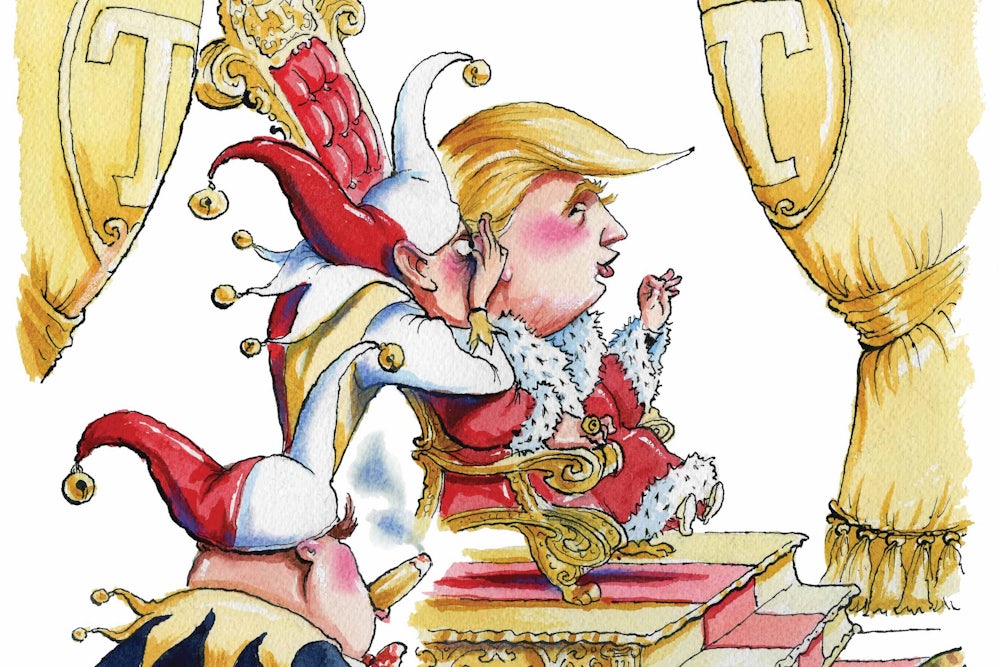From the start of Donald Trump’s erratic, improbable campaign, political observers of all stripes have been waiting for him to “pivot.” Surely, the thinking went, Trump would eventually set aside the bombast and insults and strive to reassure voters that he could be presidential. “Very shortly,” opponent-turned-supporter Ben Carson said back in March, “I think you’re probably going to see him pivoting more in the direction of everybody, rather than just those who are angry.”
But such thinking always misconstrued Trump’s nature. It’s not just that he approaches politics as a reality-TV series in need of a ratings boost, or that his entire brand is based on an attention-grabbing blend of provocation and hyperbole. It’s that Trump has never been oriented to the idea of a Trump administration. The word, with its implications of organization and stability and control, is the antithesis of what has made Trump a success. As a boss, Trump does not look for established thinkers or veteran insiders to provide him with wise counsel or even a diverse range of opinions. He surrounds himself with people—mostly white, mostly men, often wealthy—who look and sound and think just like him. He is, for all practical purposes, a party of one.
With his showman’s flair, Trump has assured anyone who will listen that he will compensate for his political inexperience and policy indifference by surrounding himself with the “best people.” They’ll be the “smartest.” Not to mention the “greatest.” Unfortunately for Trump, no one with those qualifications wants to work for him. When his campaign approached hundreds of aides to the 16 losing GOP candidates—including more than 150 who worked for Ted Cruz—the vast majority passed on the opportunity. When Trump tried to scare up endorsements in Congress, he ended up with a handful of backbench extremists. When he cobbled together a foreign policy team, he couldn’t even find a respectable ex-general from CNN, much less a credible think-tank wonk. When he put together an economic advisory team, he found exactly one willing economist.
So Trump has been forced, for reasons of his own making, to assemble what could well be the worst political team in presidential history: a rogues’ gallery of outcasts and opportunists, has-beens and never-weres, conspiracy-mongers and crackpots. Few of the advisers in his inner circle possess any real qualifications for the positions they hold. Some have been ousted from their previous jobs for incompetence, corruption, or outright craziness. Many, exiled to the political fringes, see the campaign as a way to get back into the game. Most of them, sad to say, have sunk so low that Trump looks like a big step up.
The survey of Trump’s closest advisers presented here does much to explain why his campaign went off the rails in such a spectacular fashion over the summer. Rather than compensate for his own shortcomings, both political and temperamental, Trump has surrounded himself with people who reflect and exaggerate them. It is the mark of a man who feels deeply insecure about his own worth. “Always be around unsuccessful people,” Trump advised his supporters at a rally in Wisconsin, “because everybody will respect you.” But one thing is certain: Whether or not Trump wins in November, there will not be—can never be—a Trump administration in any meaningful sense of the word. There is, in the end, only Trump. As the candidate himself boasts, “I’m speaking with myself, number one, because I have a very good brain. My primary consultant is myself.”
The Honey Badger
Stephen Bannon
Claim to Fame: Runs Trump’s favorite web site
Ties to Trump: Campaign CEO
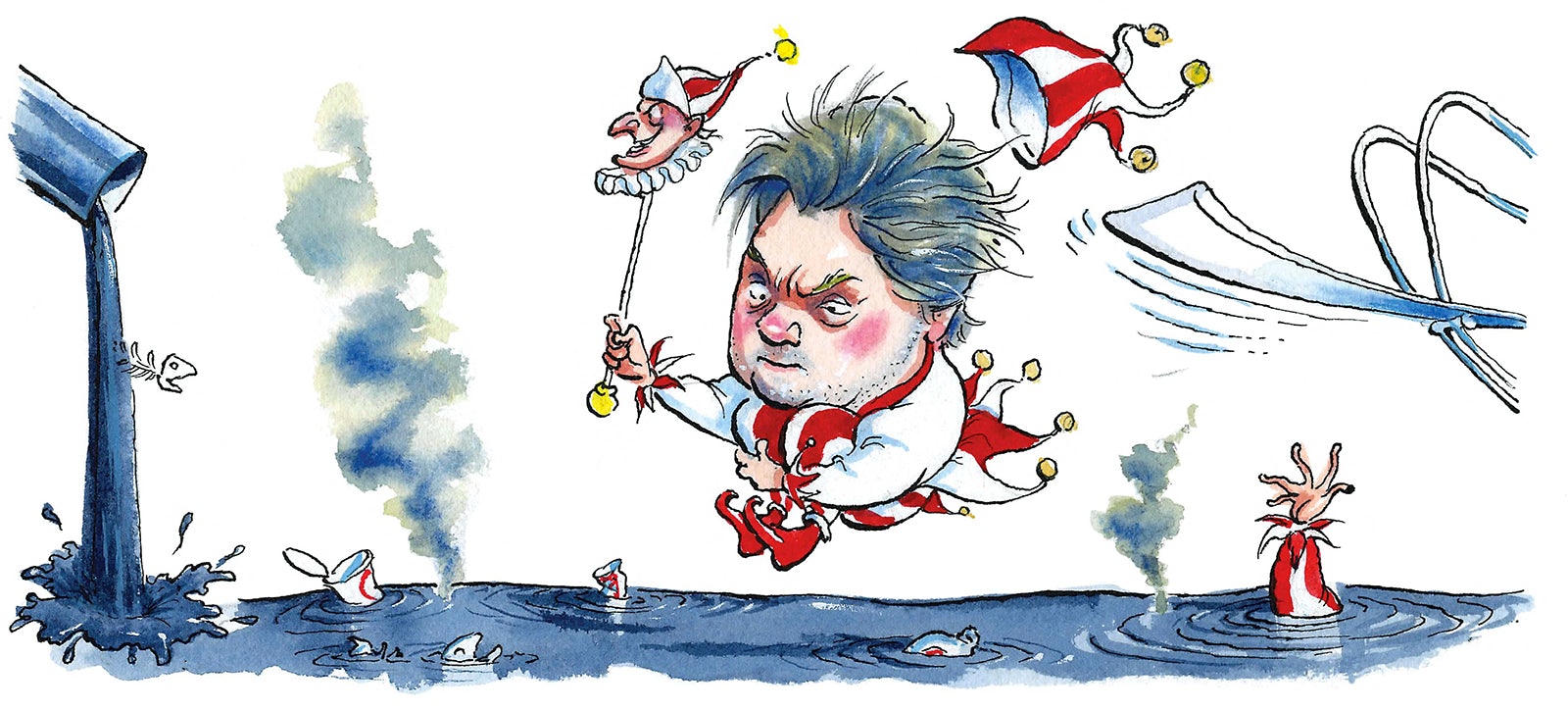
When Trump shook up his campaign leadership just 90 days before the election—for the second time in two months—he turned to a man who’s been touted as “the most dangerous political operative in America.” Bannon certainly represents the essential qualities that Trump looks for in his closest advisers: personal wealth, electoral inexperience, and a penchant for dirty tricks. A former Navy officer who had never worked a day in politics, Bannon was a banker at Goldman Sachs before taking over Breitbart News, the facts-be-damned web site that has become a shameless cheerleader for Trump. Under Bannon’s personal direction, Breitbart has launched hyperbolic attacks on Paul Ryan and other Trump enemies, and even refused to side with one of its own reporters who was publicly manhandled by Trump’s former campaign manager. “In my opinion, Steve Bannon is a bully,” said a leading editor at the site who resigned over the incident. “He has sold out Breitbart’s mission in order to back another bully, Donald Trump.”
But Bannon is more than Trump’s most ardent media promoter. Under the radar, he runs a Florida-based operation called the Government Accountability Institute, which specializes in churning out damning research on Trump’s political opponents. Where Breitbart takes a shotgun-blast approach to Trump’s foes, the institute quietly employs experts in data science to scour the so-called Deep Web for details it can use to smear the likes of Jeb Bush. Its biggest success is Clinton Cash, an investigation of Hillary and Bill’s financial dealings that spurred a major story in The New York Times.
Bannon isn’t the only right-wing media crusader who’s playing a major role in the Trump campaign. Roger Ailes, the former head of Fox News, has reportedly helped Trump prepare for the presidential debates. By some accounts, Ailes also pushed for the ouster of Paul Manafort, the campaign chairman who oversaw Trump’s summer-long implosion.
But while Manafort is out, his longtime business partner, the former Nixon operative Roger Stone, continues to serve as Trump’s conspiracy-monger in chief. A “loyal” friend of 40 years who made his fortune providing political services to an all-star team of international tyrants, Stone has fueled some of Trump’s wildest accusations (linking Ted Cruz’s dad to JFK’s killer, spreading fears of a “rigged” election), and is hawking a book of debunked attacks on the Clintons (Bill isn’t Chelsea’s real father, Hillary is a secret lesbian). “Trump without Stone,” observes the National Review, “is akin to George W. Bush without Karl Rove or Barack Obama without David Axelrod.”
Bannon certainly shares Stone’s love of political theater. In July, he called the left’s focus on police shootings a “plot to take down America,” adding, “here’s a thought: What if the people getting shot by the cops did things to deserve it?” At Breitbart’soffices in Washington, he hung a portrait of his daughter seated on a throne once used by Saddam Hussein, cradling a machine gun on her lap. “If there’s an explosion or a fire somewhere,” says Breitbart editor Matthew Boyle, “Steve’s probably nearby with some matches.” Bannon was appointed the campaign’s CEO, as aides have put it, to achieve a single goal: “Let Trump be Trump.” Indeed, Bannon’s personal credo—a nod to a viral internet video—could double as Trump’s campaign slogan: “Honey badger don’t give a shit.”
The Pit Bull
Michael Cohen
Claim to Fame: Bullying reporters
Ties to Trump: Attorney, consigliere
Want access to Trump? You’ll have to get past Cohen. Write something critical of the real estate mogul? Expect a threatening phone call from his longtime attorney. Although Cohen’s official title is executive vice president and special counsel at the Trump Organization, in practice he is Trump’s Tom Hagen—a fiercely loyal lieutenant, enforcer, and all-purpose adviser in the mold of Vito Corleone’s consigliere in The Godfather. Cohen, who serves on the fund-raising committee at the elite Manhattan prep school attended by Barron Trump, has been described as Trump’s “pit bull.” He doesn’t quibble with the characterization. “It means that if somebody does something that Mr. Trump doesn’t like, I do everything in my power to resolve it to Mr. Trump’s benefit,” he once explained. “If you do something wrong, I’m going to come at you, grab you by the neck, and I’m not going to let go until I’m finished.”
Like his boss, Cohen has a slippery grasp of the facts and a penchant for cartoonish overreaction. Last year, when The Daily Beast was investigating rape allegations leveled at Trump by his first wife, Ivana, Cohen threatened the reporter with a $500 million lawsuit. “You write a story that has Mr. Trump’s name in it, with the word ‘rape,’ and I’m going to mess your life up for as long as you’re on this frickin’ planet,” he told the journalist. Cohen went on to defend Trump against the accusations by wrongly insisting that, from a legal standpoint, “you cannot rape your spouse.” In June, Cohen tweeted a picture of Hillary Clinton and accused her of murder while she was serving as secretary of state.
Mr. Dark Money
Donald McGahn II
Claim to Fame: Campaign finance foe
Ties to Trump: Chief campaign lawyer
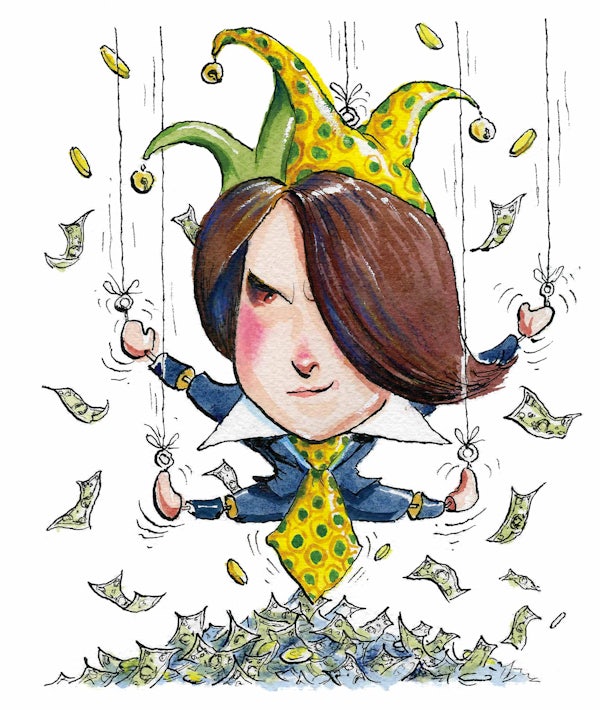
In the early days of his campaign, Trump railed against the influence of big donors and lambasted his rivals as “puppets” of the Koch brothers and Sheldon Adelson, pledging to “campaign with integrity, wholly independent of the dark-money donor class perpetuating a broken Washington.” Which made it all the more surprising when Trump selected McGahn as the lead attorney for his presidential campaign. For years, McGahn has been at the forefront of the GOP’s push to remove federal limits on campaign finance, demanding that wealthy donors and special interests be permitted to contribute unlimited sums to candidates with little or no disclosure. A former counsel to former House Majority Leader Tom DeLay, who was indicted for money laundering, McGahn spent five years on the Federal Election Commission, where he cheered the Supreme Court’s decision in Citizens United and routinely used his vote to enable America’s billionaires and corporations to corrupt U.S. politics with an unregulated flow of cash. His goal, he explained to a group of students, was actually to prevent the nation’s campaign finance laws from being enforced. “I plead guilty as charged,” he boasted.
The Rabble-Rouser
Stephen Miller
Claim to Fame: Immigration extremist
Ties to Trump: Policy adviser, hype-man
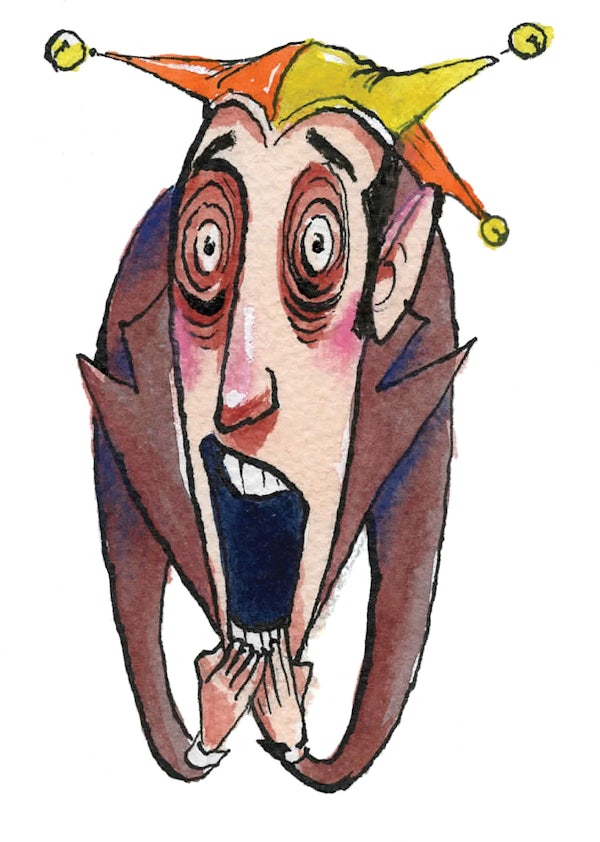
When Trump needed someone to write his apocalyptic acceptance speech at the Republican National Convention, he turned to one of the youngest advisers in his inner circle. Only 30, Miller is a formerly obscure congressional staffer who’s become famous as the sharply dressed, chain-smoking hype-man at Trump rallies, where he riles up the crowds with grim forebodings about the twin threats posed by “radical Islamic terrorism” and rampaging, murderous illegal immigrants. Miller is Trump’s nativist whisperer.
Miller has been pounding his radical conservative message since his student days: At Duke University, he became a cause célèbre on the right for declaring that efforts to fight racism are actually a form of “racial paranoia,” and that Hollywood is one big pro-LGBT conspiracy, a dangerous force that “feels sympathy for the terrorists, detests Republicans, and sees America as an obstacle to a better world.” As a teenager, Miller was such a prodigy of conspiratorial extremism that he served as a guest on conservative talk-radio shows more than 30 times. On Capitol Hill, he made more fans on the fringe: As a lieutenant to Senator Jeff Sessions, the anti-immigration crusader who was Trump’s first Senate endorser, Miller was credited with plotting behind the scenes to kill comprehensive immigration reform in 2014. Sessions compares him favorably to Karl Rove. But Ann Coulter, who knows a good rabble-rouser when she sees one, may be Miller’s most ardent groupie. When Trump appointed him to the campaign, Coulter tweeted, “I’M IN HEAVEN!”
The Rogue Warrior
Lt. Gen. Michael Flynn (Retired)
Claim to Fame: Ousted By Pentagon
Ties to Trump: Top Military Adviser
America’s national security establishment, hidebound by nature and wary of change, couldn’t be more terrified by the prospect of a President Trump. An August letter signed by 50 GOP national security experts warned that Trump “would be the most reckless president in American history.”
Flynn, one of the few military officers to support Trump, has a 33-year career of seeking out recklessness. As an aide to disgraced General Stanley McChrystal, Flynn served as director of intelligence for the Joint Special Operations Command, a shadowy team of highly trained soldier-assassins. His final assignment was heading the Defense Intelligence Agency, the Pentagon’s internal spy agency, until he wasforced into early retirement in 2014 after butting heads with his superiors, who deemed him “disruptive.”
A year into his retirement, Flynn was asked to join Trump’s campaign team, where he has pushed the candidate to oppose the Iran nuclear treaty and take a more aggressive position on fighting the Islamic State. (Flynn calls Islam a “cancer” that “hides behind being a religion.”) Vetted as a potential candidate for vice president, Flynn also shares Trump’s fondness for Vladimir Putin. A frequent contributor on Russia Today, the Kremlin-backed network, Flynn sat at the head table with the Russian president during the media outlet’s tenth anniversary gala in Moscow last December.
The Knight Of Malta
Joseph Schmitz
Claim to Fame: Too Corrupt For Rumsfeld
Ties to Trump: Foreign Policy Adviser
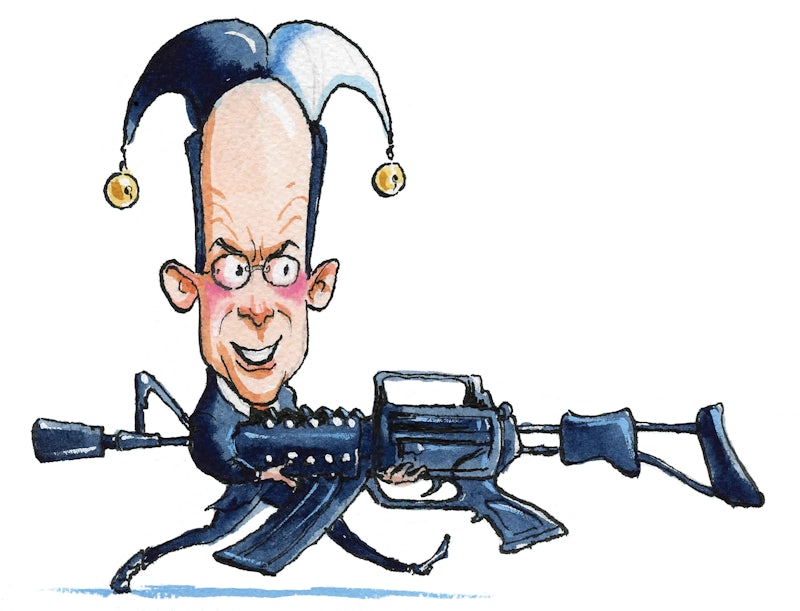
Schmitz, who was named to Trump’s five-man foreign policy advisory team, served under George W. Bush as the Pentagon’s inspector general, but was forced out by Donald Rumsfeld over corruption charges. John McCain savaged his tenure at the Defense Department as “a textbook case of bad procurement policy and favoritism.” Schmitz wasted no time cashing in on his disgrace: He went to work for the very military contractors he had been charged with regulating, serving as general counsel for the Prince Group, the company that owned the notorious private military firm Blackwater.
Schmitz is closely tied to the Center for Security Policy, a group whose anti-Muslim paranoia is so extreme that it’s been banned from attending the annual gathering of the Conservative Political Action Committee. In 2014, he attempted to coordinate a shipment of 70,000 assault rifles and 21 million rounds of ammunition to the Free Syrian Army, financed by a Saudi prince. (The CIA shut the operation down.) Schmitz also belongs to the Sovereign Military Order of Malta, the Christian “knights” tasked with defending “territories that the Crusaders had conquered from the Muslims.” One prominent member of a conservative think tank, quoted anonymously in the National Review, offered a simple summary of Schmitz’s reputation: “He’s just a nut.”
Senator Sycophant
Jeff Sessions
Claim to Fame: Immigration hard-liner
Ties to Trump: Chief ally in Senate
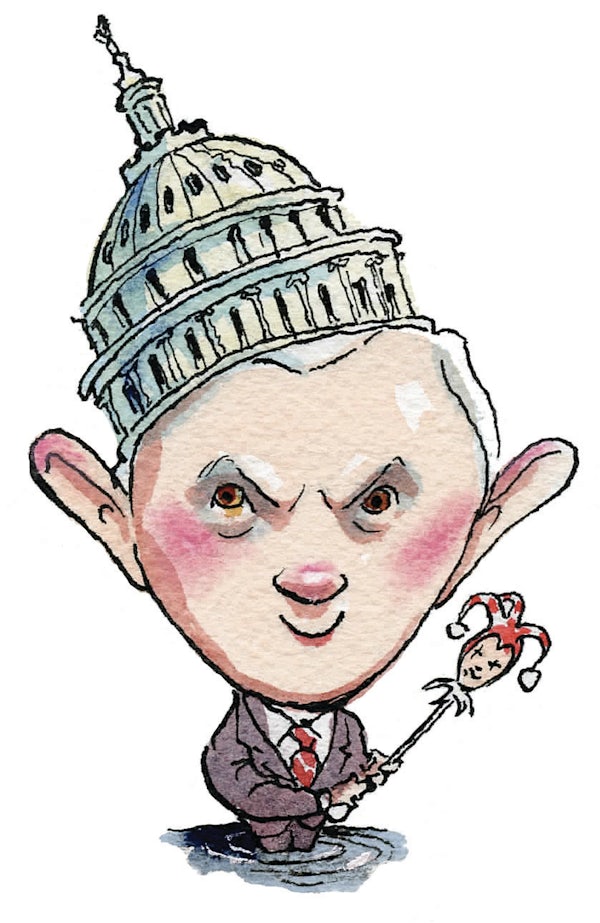
In February, Sessions became the first U.S. senator to endorse Trump, praising his anti-immigration platform and opposition to the Trans-Pacific Partnership. Their relationship extends back to 2005, when the Alabama Republican invited Trump to testify before a Senate subcommittee about the United Nations’ renovation plans. (Trump dismissed the $1.2 billion makeover as excessive, claiming he could do the job better, and for half the price.) Sessions called the testimony the best he’d ever heard.
One of the most nativist members of Congress, Sessions was an early cheerleader for a border wall with Mexico. His appointment as a federal judge under Ronald Reagan was opposed by both Democrats and Republicans due to his record of prosecuting civil rights activists while U.S. attorney for Alabama. He dismissed the naacp as “Communist-inspired,” and denounced a white civil rights lawyer as a “disgrace to his race.”
In May, after Trump said he would speak with North Korean leader Kim Jong Un, Sessions defended Trump’s prowess as a deal-maker: “There’s nobody who has run for president in years who understands how to negotiate more effectively than Donald Trump.” The sales pitch hasn’t worked: Just days after Sessions endorsed Trump, prominent members of the GOP foreign policy establishment published an open letter criticizing everything from Trump’s ill-conceived border wall to his “hateful, anti-Muslim rhetoric.”
The Islamophobe
Walid Phares
Claim to Fame: Spokesman for murderous militiamen
Ties to Trump: Foreign policy adviser
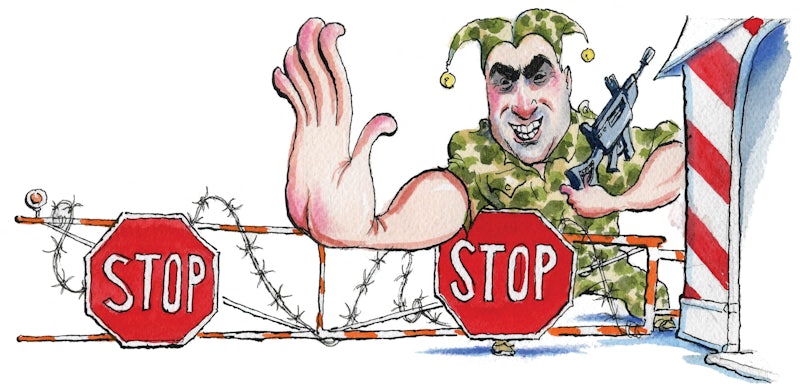
Trump’s plan to ban Muslims from entering the United States has taken a variety of shapes and forms. First, it was a “total and complete shutdown of Muslims entering the United States.” Then, following the inevitable backlash, it became a temporary ban on Muslims—including those with U.S. citizenship. In July, Trump demanded a halt to immigration “from any nation that has been compromised by terrorism”—a tweak, Trump crowed, that would actually expand his Muslim ban. But what all the versions have in common, besides their roots in Red Scare paranoia, is their debt to Phares, one of Trump’s most influential—and conspiracy-minded—advisers.
A professor and former analyst at neoconservative think tanks, Phares is a fixture on Fox News and Arab-language TV networks, his commentary shot through with conspiracy theories about Islamic “fundamentalists” and “jihadists,” along with a healthy dose of fearmongering about a looming war between the West and Islam. In books with titles like Future Jihad: Terrorist Strategies Against America, Phares decries the depth of “Islamic jihad’s” infiltration of the U.S. government. Before September 11, he writes, “the Wahabi influence was so profound and subtle that it made its arms within the State Department, CIA, and information agencies think that they, not the Wahabis, were in control of policy.” Another tactic of “jihadists within the West,” argues Phares, is to “pose as civil-rights advocates,” infiltrate “almost all mosques, educational centers, and socioeconomic institutions,” and then wait for a “holy moment” to strike. Trump’s rhetoric on terrorism and “radical Islam” echoes such paranoia: In June, he asserted—with zero evidence—that many Syrian refugees seeking entry into the United States are members of ISIS.
At first, Trump appeared to believe that Phares was a Muslim who hates Islam—the perfect man to advise him on Middle East policy. In March, soon after he named Phares to his foreign policy team, Fox News host Brian Kilmeade twice referred to Phares as Muslim—and Trump failed to correct him. “Yes, that’s true,” Trump agreed at one point.
In fact, Phares is Maronite, the largest Christian sect in Lebanon. During the 1980s, he worked as a top political official and propagandist for a Christian sectarian militia that massacred thousands of Muslims in Lebanon’s Sabra and Shatila refugee camps. When he moved to the United States in 1990, Phares reinvented himself as a counterterrorism expert. After the September 11 attacks, he began appearing regularly on Fox, offering grave warnings to Bill O’Reilly’s viewers. “Linguistically, the Arabic language is a very powerful one,” he explained. “It has a lot of codes. It could be used in a lethal way.” During the Bush years, Phares testified before Congress on “Islamist terrorism,” served on a Homeland Security task force on “Future Terrorism,” and had two of his books placed on a summer reading list compiled by GOP members of Congress. By 2011, he had gained such currency in Republican circles that Mitt Romney named him a national security adviser.
Phares personally briefs Trump on foreign policy, offers analysis of breaking news, and writes policy papers for him. In his frequent television appearances on Trump’s behalf, he fills in the blanks in the candidate’s pledge to rewrite U.S. foreign policy in the Middle East. A Trump administration, he explained on Al Arabiya TV in August, will pursue three Middle East policies: rejecting the Iran deal, forming new coalitions in the region, and dismantling ISIS and defeating its ideology.
Trump has taken his adviser’s “terrorist under every bed” paranoia to heart. In a high-profile address in August, he reiterated his pledge to ban immigration from certain countries and vowed to create a McCarthyesque “screening test” to keep out “any who have hostile attitudes towards our country or its principles.” One of his first acts as president, he said, would be the creation of a commission to “identify and explain to the American public the core convictions and beliefs of radical Islam.” Sounds like a job tailor-made for Phares.
Fracker In Chief
Harold Hamm
Claim to Fame: Fracking true believer
Ties to Trump: Energy policy adviser
Unlike Trump, Hamm is indisputably a billionaire, and a self-made one at that. The 13th child in a family of sharecroppers in rural Oklahoma, he grew up to make his fortune—some $13.7 billion, according to Forbes—with Continental Resources, which he founded when he was only 21. An energy company best known for its extensive fracking in North Dakota, Continental has been responsible for more “environmental incidents”—industry-speak for spills, fires, pipeline breaks, and oil-train derailments—than any other company drilling in the state. Hamm, whom Trump calls the “king of energy,” is being touted as a potential secretary of energy. That would make Hamm the first energy secretary in U.S. history to move directly from the oil and gas industry into the cabinet, a reverse revolving door that would put the Big Oil cronyism of George W. Bush to shame.
Hamm met Trump in 2012, when he was an adviser to Mitt Romney. During a private chat at Trump Tower in New York, they discussed Hamm’s vision for U.S. energy policy—get more oil out of the ground—and Trump’s sense of fashion: Hamm soon appeared on the cover of Forbes in a Trump-brand necktie, a gift from the Donald. Hamm, who shares Trump’s reckless temperament, is fond of drawing wild links between energy policy and national security. “Every time we can’t drill an oil well in America, terrorism is being funded,” he declared at the Republican National Convention. “Climate change isn’t our biggest problem—it’s Islamic terrorism.”
A Voice From Above
Paula White
Claim to Fame: Converted Trump to Christianity
Ties to Trump: Evangelical outreach leader
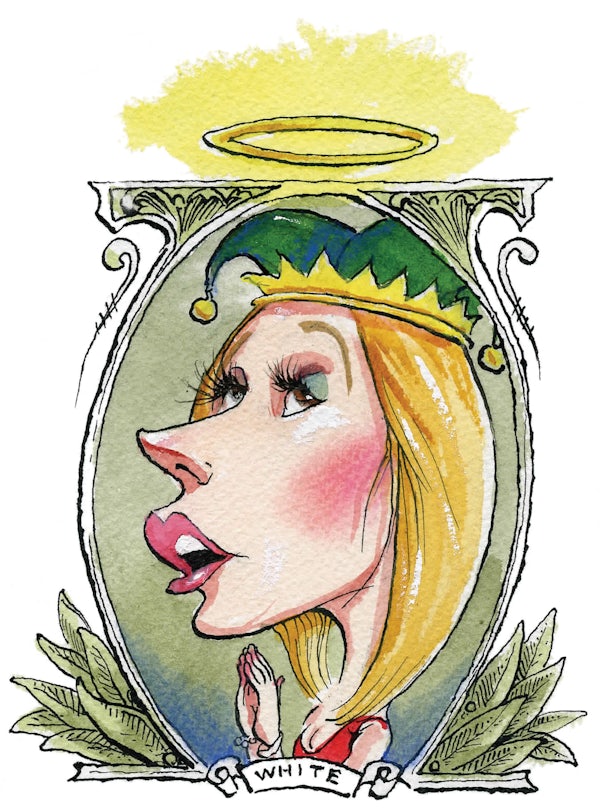
Trump enjoys a commanding lead among America’s evangelical voters, yet his credentials as a Christian are notoriously shaky. He says no one reads the Bible more than he does, but when asked to name his favorite verse, he cited a Proverb (“Never bend to envy”) that doesn’t exist. He says he’s never asked for forgiveness because he’s never done anything that requires forgiveness. He says he’s a Presbyterian who attended Marble Collegiate Church in Manhattan—except that Marble Collegiate isn’t Presbyterian, and it has no record of Trump being a member. “If anything, this man is a baby Christian who doesn’t have a clue about how believers think, talk, and act,” says James Dobson, the evangelical heavyweight who founded Focus on the Family.
So how to explain Trump’s standing among evangelicals? A big part of the answer is White, a popular, Florida-based televangelist who has led Bible study with the New York Yankees and leveraged her friendship with Oprah to meet the Obama family. White, who serves as Trump’s spiritual adviser, preaches the prosperity gospel—the belief that God rewards the faithful with material wealth. (Imagine Gordon Gekko’s adage, “Greed is good,” with a semi-scriptural twist.) While most evangelical leaders view peddlers of the prosperity gospel as frauds, White has turned the promised land into a source of profit, creating Paula White Ministries to hawk her books (Move On, Move Up) and DVDs (Why We Want You to Be Rich).
The way White tells it, she and Trump met through divine intervention. Several years ago, she says, Trump was flipping through TV channels when he stopped on one showing White delivering a sermon titled “The Value of Vision.” Trump called White to compliment her, and the two struck up a friendship that supposedly led to White overseeing Trump’s conversion to Christianity. Trump and White have never confirmed this account, but when he launched his presidential campaign last June, he turned to White to serve as his spiritual adviser and lead his outreach to the religious right. White introduces Trump at rallies, delivered the benediction at the RNC, and procured a Bible for him that was signed by no less than the Reverend Billy Graham, the iconic evangelist.
In many ways, Trump and White make a perfect match. White is a political neophyte—GOP officials in Florida say they’d never heard of her before Trump’s campaign. Her advice to the faithful sounds like an excerpt from one of Trump’s books: “Find your passion in life and figure out a way to make money.” Like Trump, White enjoys the high life—she once bragged of having “millions in the bank”—and has a past littered with controversy. In the late 2000s, a church run by White and her second husband was targeted by congressional investigators for allegedly abusing its tax-exempt status by providing its leaders with private planes and multimillion-dollar homes. (The Whites declined to cooperate with investigators and were never charged.) White, twice divorced, is now married to former Journey keyboardist Jonathan Cain.
Many prominent evangelical leaders either don’t know White, or say they despise her. “Paula White is a charlatan and recognized as a heretic by every orthodox Christian, of whatever tribe,” Russell Moore, an influential Southern Baptist leader, tweeted in June. Nevertheless, White has attracted an ideologically extreme group of leaders to Trump’s evangelical advisory team, including Michele Bachmann, former Christian Coalition mastermind Ralph Reed, and mega-church pastor Robert Jeffress. Their large followings and celebrity status among evangelicals have lent a sheen of spiritual respectability to Trump’s decidedly un-Christian positions. Like Trump, they’re all given to incendiary remarks. Jeffress, who leads the 12,000-member First Baptist Church in Dallas, is best known for warning that legalizing gay marriage will “pave the way” for the Antichrist “to persecute and martyr Christians without any repercussions whatsoever.” He also preaches that Catholicism is satanic: “Much of what you see in the Catholic Church today doesn’t come from God’s Word, it comes from that cultlike, pagan religion,” he says. “Isn’t that the genius of Satan?”
Trump’s most prominent evangelical backer is Jerry Falwell Jr., the popular televangelist and president of Liberty University. Falwell has urged Christians to arm themselves, and argued that if more people had concealed-carry permits for handguns, “We could end those Muslims.” During the campaign, Falwell has compared the real estate mogul to Martin Luther King Jr. and even Jesus Christ himself.
White knows that Trump doesn’t sound like Christ—but she dismisses his hate-filled pronouncements as a matter of semantics. “He doesn’t know our Christianese,” she told the Christian Broadcasting Network recently. “Someone might take a sound bite and say, ‘Oh, see? He’s not saved,’ or ‘He doesn’t love God.’ That’s the furthest thing from the truth.”
The Apologist
Jeffrey Lord
Claim to Fame: TV pundit
Ties to Trump: Believes that Trump University is a great school
Lord, a CNN commentator and former political director in the Reagan administration, earned his place in the Trump orbit in 2013, when he denounced a New York State lawsuit against Trump University as “bizarre, wacky, and legally weak.” Not satisfied with simply defending Trump’s scam school, he hailed the tycoon as an “American icon—the walking definition of how to make your own American dream your reality.”
Trump helped Lord get his job at CNN, and Lord has rewarded that act of patronage by serving as his most devoted media apologist. Where other conservative pundits have taken pains to distance themselves from Trump’s flare-ups, Lord has run headlong into the flames. When Trump played coy with the endorsement of David Duke, Lord claimed that the former grand wizard of the KKK was actually a “hard-core leftist” out to discredit Trump. And when Trump insinuated that the election itself could be “rigged,” Lord rushed to agree: “I am worried that the election could be stolen.”
Even his fellow conservatives are disgusted by such blatant sycophancy. “I don’t envy Jeffrey having to carry Donald Trump’s decidedly fetid water every day,” said S.E. Cupp, a fellow CNN commentator. In another appearance, GOP strategist Ana Navarro turned to Lord on air and said it was “just too much on an empty stomach, in the morning.” Lord had just compared Trump to Abraham Lincoln.
The Wall Builder
Kris Kobach
Claim to Fame: Brains behind the far right’s nativist crusade
Ties to Trump: Leading immigration adviser

No public official in American politics has done more to plant the seeds of Trump’s anti-immigration agenda than Kobach. Even before he was elected Kansas secretary of state during the Tea Party wave of 2010, Kobach led the right-wing crusade against the mythical scourge of “voter fraud” perpetuated by “illegal aliens.” His fingerprints can be found all over restrictive voting laws and anti-immigrant policies far beyond Kansas. Kobach helped write the so-called Show Me Your Papers measure in Arizona that allowed police to demand proof of citizenship from anyone suspected of being undocumented. He authored a draconian law in Alabama that bars illegal immigrants from attending school, renting apartments, and obtaining work. He inspired Mitt Romney’s infamous call for a “self-deportation” policy in 2012. “He is one of the most dangerous public officials I am aware of in the United States,” says Rick Hasen, a leading expert on voting rights.
Kobach’s self-proclaimed goal is to make America “inhospitable” to undocumented immigrants, and he has played a lead role in shaping Trump’s deport-them-all- and-ban-the-rest approach. Kobach suggested that Trump force immigrants to pay for a wall along the border with Mexico by seizing payments they send home to their families. He also led the push to embed Trump’s border- wall fantasy in the GOP’s platform. In July, when Trump was criticized by Khizr Khan, the father of a Muslim-American soldier killed in Iraq, Kobach complained on talk radio that he was tired of being “lectured about our Constitution” by “aliens in the United States.” (Khan and his wife, Ghazala, are both U.S. citizens.)
Trump has also parroted Kobach’s talking points about voter fraud—a nonexistent threat that Republicans have used to block voters of color in many states from casting ballots. “I want to see voting laws so that people that are citizens can vote,” Trump said in May. “Not so people can walk off the street and can vote, or so that illegal immigrants can vote.”
Like Trump, Kobach is also one of the few politicians who still flirts with birtherism. In 2012, as Kansas secretary of state, he floated the idea of removing President Obama from the ballot as a noncitizen. And in April, responding to a talk-radio caller, Kobach insinuated that Obama supports immigration reform because he’s really an illegal immigrant himself. “You know,” Kobach said, “he would rather not bring up the citizenship issue.”
Congressman Nuke ’Em
Duncan Hunter
Claim to Fame: Wants to nuke Iran
Ties to Trump: Congressional cheerleader
One of the first congressmen to endorse Trump, Hunter has worked to drum up support among his fellow GOP lawmakers. So why did only eleven House members declare themselves for Trump before he secured the Republican nomination? “I think you have more Trump supporters in Congress,” Hunter told reporters. “They just have to come out of the closet, so to speak.”
When it comes to the military, however, the member of the House Armed Services Committee wants to keep the closet firmly closed. Hunter opposed repealing “Don’t Ask, Don’t Tell,” arguing that the “homosexual lobby” would “take over.” He also opposed the defense secretary’s decision to include women in combat roles, and wants the Obama administration to drop nuclear bombs on Iran. “If you have to hit Iran,” he declared in 2013, “you do it with tactical nuclear devices and you set them back a decade or two or three.”
Like Trump, Hunter has a flair for the theatrical. At a recent hearing, he defiantly puffed on a vaporizer in a losing battle to allow e-cigarettes on airplanes. But convincing his fellow Republicans to back Trump is proving such a tough sell that he’s taken to suggesting they overlook the candidate’s erratic temperament. “It’s like having the best home decorator in the world, but when he works on your house, he leaves beer cans around, he plays loud music, his pants aren’t all the way up when he bends over, but he still is the best home remodeler in the world,” Hunter told Fox News in June. “That’s what I want as president. I don’t really care about Trump’s personality.”
The Tax Man
Stephen Moore
Claim to Fame: Reaganomics peddler
Ties to Trump: Top economic adviser
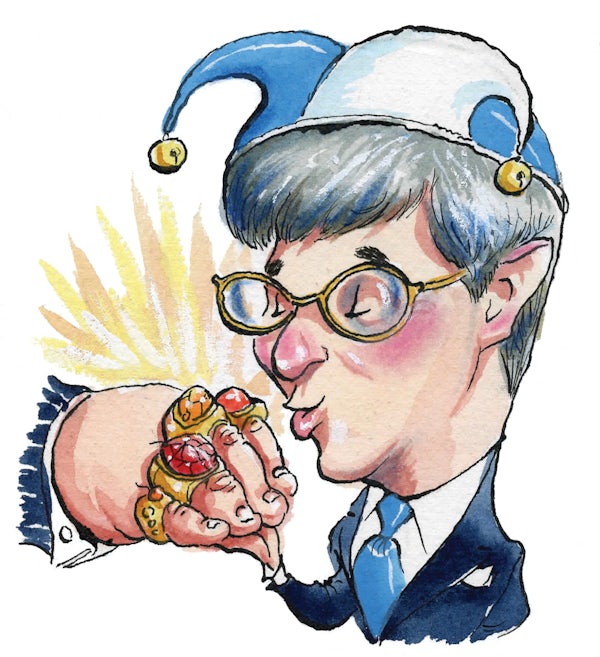
Throughout his campaign, Trump has mocked his opponents for kissing the ring of the billionaire Koch brothers. “I don’t want their money or anything else from them,” he tweeted last summer. “Cannot influence Trump!” Yet when it came time to craft his tax plan, Trump turned to Moore, who enjoys close ties to Americans for Prosperity and the American Legislative Exchange Council—two Koch-backed organizations. (Moore previously worked at the Cato Institute, another Koch group.)
A former research director for Ronald Reagan and a longtime believer in supply-side economics, Moore’s tax plan for Trump calls for $38 billion in tax breaks for the wealthy. “Capitalism,” he has argued, “is a lot more important than democracy.” In August, he was named to Trump’s economic advisory council along with 13 other white men (and four other Steves). A visiting fellow at the Heritage Foundation, Moore has called climate change “one of the greatest propaganda campaigns in world history.”
While his support for Trump has been criticized by his friends at the National Review, Moore seems thrilled to be in the candidate’s inner circle. The last time he had the chance, he blew it—forgetting about a meeting he had requested with George W. Bush in 1999. He’s been filled with regret ever since. “If I had been at that meeting,” he recently lamented, “it would have changed my life.”
The Paper Pusher
Steven Mnuchin
Claim to Fame: Subprime profiteer
Ties to Trump: National finance chair
After pretending for months that he was self-funding his campaign, Trump owned up to the realities of running a billion-dollar presidential bid and brought on a full-time money man to handle his fund-raising. Mnuchin earned his fortune as a partner at Goldman Sachs—a firm Trump attacked during the GOP primary for its ties to Ted Cruz—and later formed his own hedge fund, making him the type of investor that Trump has savaged as “paper pushers” who are “getting away with murder” for how little they pay in taxes. In 2008, Mnuchin and a group of investors bought the subprime-mortgage portfolio of the failed bank IndyMac at a steep discount. With federal guarantees to cover major losses, Mnuchin churned out $2 billion in dividends to his investor pals by engaging in dodgy foreclosure practices, then made another $2 billion by selling the bank.
Mnuchin has made a name for himself as a movie producer—The Legend of Tarzan, Mad Max, Suicide Squad—but he raised eyebrows in Hollywood when it was revealed that he’d quietly ditched his post as the co-chairman of Relativity Media, a once-booming studio, just before it declared bankruptcy. Mnuchin says he and Trump have been friends for 15 years, despite Trump once suing Mnuchin over a real estate deal.
In July, Trump raised $82 million for his campaign and the national GOP. For Mnuchin, Trump’s campaign is a distressed asset—and a win in November would be the ultimate turnaround job.
Burger Boy
Chris Christie
Claim to Fame: Something about a bridge
Ties to Trump: Transition team chairman

The announcement shook the Republican Party to its crumbling foundations: Christie, stalwart of the GOP establishment and contender for the party’s nomination, had endorsed Trump for president. After Sarah Palin, it was the New York tycoon’s first high-profile Republican endorsement, and it gave Trump an injection of much-needed credibility. Longtime Christie supporters were “shocked” by his decision to “betray” the party. But another Christie loyalist recognized it for what it was: “an astonishing display of political opportunism.” The wildly unpopular, term-limited governor of New Jersey needed a job—and a future. His fall from grace had begun with an email: “Time for some traffic problems in Fort Lee.” With those eight words, written by a close Christie aide, a nasty backup on the George Washington Bridge exploded into Bridgegate, a full-blown scandal that tanked Christie’s bid for the White House.
Once on the Trump bandwagon, Christie began to look like a man questioning his life choices. His woebegone expression during Trump’s Super Tuesday victory lap sent Twitter into a frenzy: One GOP member of Congress likened it to “a hostage situation,” and the hashtag #FreeChrisChristie went viral. Angling for the VP slot, Christie reportedly went so far as to fetch Trump cheeseburgers from McDonald’s. Mike Pence’s ascension to the ticket left Christie with little incentive to stay on message. But Trump dangled a consolation prize: Christie, he has told reporters, “would make a great attorney general.”
Buckaroo Bozo
Sid Miller
Claim to Fame: Champion cattle roper
Ties to Trump: Agriculture adviser
Miller is Texas agriculture commissioner, a position he has undertaken with a Trumpian mix of self-regard and jaw-dropping peculiarity. Among other acts, he changed the design on the state’s fuel-pump inspection stickers to more prominently feature his name, and he advocated for “local control” of deep fryers and soda machines in public schools. Miller, who is currently under investigation by the state’s ethics commission for campaign finance irregularities, has been accused of rewarding one campaign consultant, and the wife of another, with seats on the agriculture commission that pay $180,000 a year. (Miller’s campaign treasurer was none other than Ted Nugent.) The Texas Rangers have also launched a criminal probe into Miller’s misuse of public funds. A champion cattle roper, Miller used $2,000 from state coffers to cover expenses for a trip to the Dixie National Rodeo last year. (No word on whether he reimbursed the state with his $880 in prize money.) He also spent at least $1,120 in taxpayer money on a medical excursion to Oklahoma to receive a snake-oil cocktail, known as the “Jesus Shot,” to help with chronic pain caused by his career as a rodeo cowboy. “Worked out good,” he said of the treatment. Could Miller be appointed agriculture secretary under President Trump? “I’d have to pray about it,” he said. “Right now I’ve got the best job in the state of Texas.”
Mayor Of Mean
Rudolph Giuliani
Claim to Fame: “America’s Mayor”
Ties to Trump: Surrogate in chief

Trump’s improbable rise has handed a second—or third, or fourth—chance to a crew of washed-up demagogues and Republican retreads. Consigned for years to the fringes of the GOP, these political exiles have latched on to Trump as a way to regain the limelight. They have hit the campaign trail, resurfaced on Sunday talk shows, and angled for spots in a Trump administration with the sweaty desperation of gamblers looking for one last lucky streak. They were losers—until Trump dealt them back into the game.
Rudy Giuliani offers a textbook example. A self-promoting prosecutor who rode his crime-fighting reputation to the New York mayoralty in 1994, Giuliani essentially served as Trump 1.0. He lashed out at everyone from squeegee kids to Times Square strippers, instituted draconian “stop and frisk” laws that unleashed a wave of racial profiling, and made headlines with his messy divorce. By September 2001, Giuliani was a largely disliked, term-limited mayor who seemed destined for political oblivion. Then the September 11 attacks turned him into one of America’s most revered politicians, the unbowed leader of a shaken but resilient city. Time named him Person of the Year. The Queen of England bestowed an honorary knighthood. He was “America’s Mayor.”
After leaving office and cashing in with lucrative gigs in security consulting, investment banking, and legal services, Giuliani sought to parlay his fame into a White House bid in 2008. But his campaign set a new standard for boneheaded strategy and tone-deaf messaging. Giuliani evoked his experience of guiding New York City through the aftermath of the terror attacks so relentlessly that one pundit described him as suffering from “9/11 Tourette’s syndrome.” He largely sat out the first seven primaries of the race, hinging his campaign on winning Florida. Instead, he finished a distant third, and dropped out the next day.
Afterward, Giuliani receded from view. If he made news at all, it was usually for saying something offensive about Obama. (“I do not believe that the president loves America,” Giuliani declared at a GOP fund-raiser last year.)
Then along came Trump, who needed allies. When Trump clinched the nomination in May, Giuliani emerged as one of his go-to surrogates, charged with defending him and airbrushing his screwups—a skill Giuliani honed during his eight years battling the New York press and cleaning up after his own blunders. (He once quipped that the “dysfunctional” New York City school system “should be blown up.”) Trump’s claim that President Obama was “the founder of ISIS”? Giuliani called it “legitimate political commentary.” When Trump said that only “Second Amendment people” could stop Hillary Clinton if she won the White House? Giuliani rejected the notion that the nominee was calling for violence. “If Donald Trump was going to say something like that, he’d say something like that,” he explained on Good Morning America. Giuliani echoes the candidate’s disdain for facts, even about September 11. “Under those eight years before Obama came along,” Giuliani wrongly asserted in August, “we didn’t have any successful radical Islamic terrorist attack in the U.S.”
At the RNC, the former mayor set the tone with his opening-night, prime-time speech, in which he hectored America about the need to crack down on its enemies. “You know who you are,” he barked, “and we are coming to get you.” The speech was described by a range of political observers as “bombastic,” “truly unhinged,” and “a disaster.”
Fortunately for America, Giuliani is one of the worst people to whom Trump could have turned for campaign advice. When Trump’s campaign was on the verge of imploding in July, Giuliani was one of a handful of GOP officials who reportedly joined RNC chairman Reince Preibus in staging an “intervention.” Afterward, Giuliani boasted that his sage counsel had done the trick. “You’re going to see Donald Trump campaigning in a somewhat different way going forward,” he predicted, “an evolution that will focus much more on the positive than the negative.”
Two days later, Trump was blasting away at Hillary Clinton over her use of a private email server. “Anybody whose mind ‘SHORT CIRCUITS’ is not fit to be our president!” he tweeted. “Look up the word ‘BRAINWASHED.’”
Scalia Reborn
William Pryor Jr.
Claim to Fame: States’ rights zealot
Ties to Trump: Supreme Court contender
Pryor, an appeals court judge and former Alabama attorney general, is America’s most prominent judicial champion of states’ rights—and the closest conservatives are going to get to a cryogenically revivified Antonin Scalia. One of a handful of judges Trump named to his short list for the Supreme Court, Pryor was appointed to the federal bench by George W. Bush while the Senate was in recess. His record reads like a conservative fantasy: He has denounced Roe v. Wade as “the worst abomination in the history of constitutional law.” He detests that citizens arrested by the police are entitled to be read their Miranda rights. He has argued that the government should appoint attorneys to represent the interests of fetuses, and that legalizing gay sex gives a green light to “prostitution, adultery, necrophilia, bestiality, possession of child pornography, and even incest and pedophilia.”
Like Trump, Pryor also wants to strike down laws designed to protect minorities against bias and mistreatment. Before he landed on the federal bench, he filed an endless stream of amicus briefs in Supreme Court cases, arguing that federal laws against discrimination—based on everything from age and race to gender and disability—are unconstitutional. States, Pryor argues, must be free to discriminate as they see fit. Anything else would be “anti-democratic.”
The Revolutionary
Newt Gingrich
Claim to Fame: Contract With America
Ties to Trump: On Trump’s VP short list
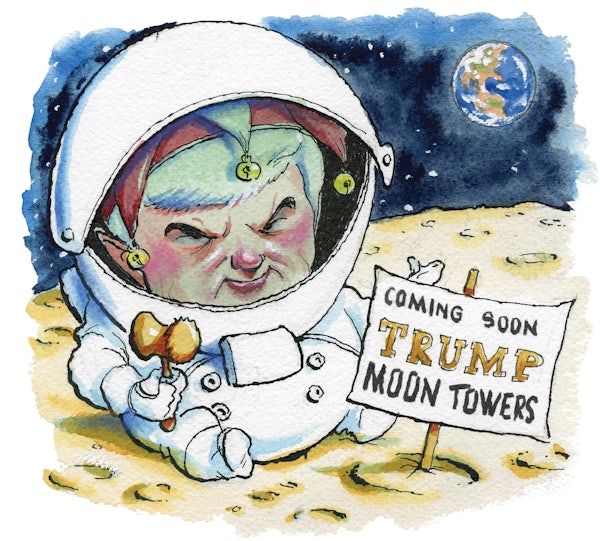
It’s been years since Gingrich was chased from public office over his ethical violations and disastrous political leadership, and he made no secret of his desire to return to Washington on Trump’s coattails, eagerly lobbying for the position of vice president. “In one form or another, Newt Gingrich is going to be involved with our government,” Trump announced in July. “He says I’m the biggest thing he’s ever seen in the history of politics.”
Trump and Gingrich have much in common: Both dumped two wives for younger women, and both dream of grand projects to defend America against illegal aliens. (“By the end of my second term,” Gingrich said during his own presidential bid in 2012, “we will have the first permanent base on the moon.”) “Newt is a revolutionary,” Trump ally Roger Stone told the National Review, “and Trump is leading a revolution.”
But when Trump picked Mike Pence as his VP, Gingrich looked like a man who had sold his soul, only to discover it was worthless. He had not only lost his gig as a Fox News contributor, he’d shamelessly flip-flopped on many of his longtime views, even going so far as to endorse Trump’s proposed ban on Muslims. Still hoping for a post in a Trump administration, he continues to tout the candidate, boasting that Trump will win in a landslide. “Frankly,” Gingrich has predicted, “he’s going to end up beating Hillary by surprising margins.”

Correction: The original version of this article said that Schmitz belongs to the Sovereign Military Order of Malta. In fact, he resigned from the Order in 2012.
